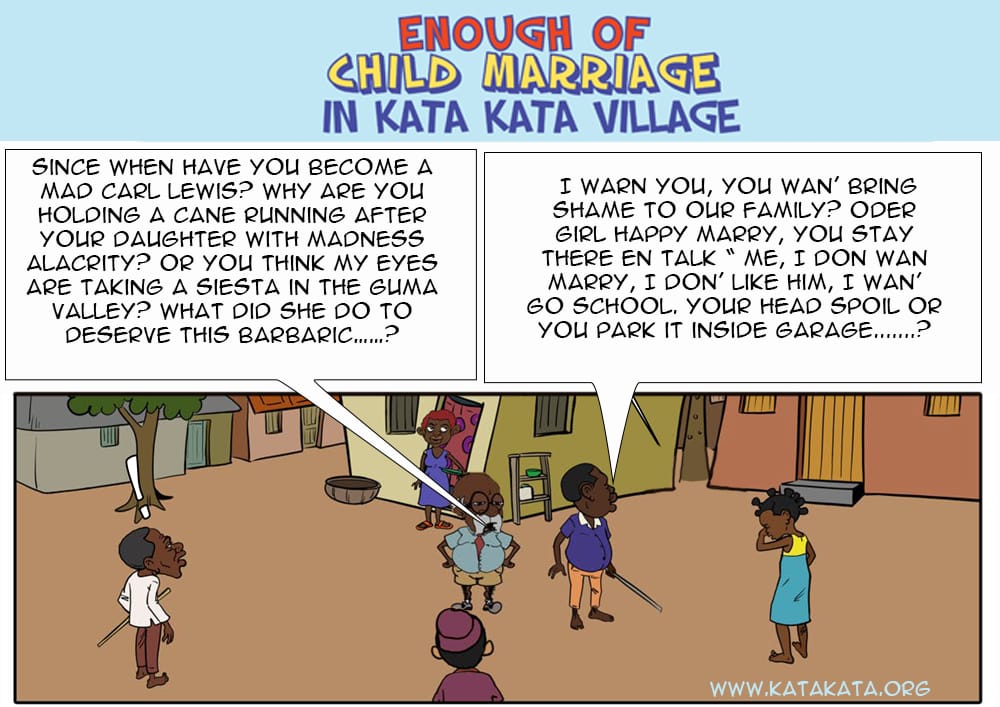Sierra Leone Bans Child Marriage: A New Dawn for Children's Rights.
Today marks a
historic milestone for children's rights in Sierra Leone as President Julius
Maada Bio signed into law the ban on child marriage. This decisive action
represents a significant leap forward in the nation's commitment to protecting
its youth and promoting gender equality.
This article
explores the immediate and long-term implications of this landmark decision,
highlighting its potential to transform the lives of countless children and
foster a more equitable society.
The ban could not
have come at a better time. Child marriage has been a pervasive issue in Sierra
Leone, with approximately 30% of girls married before their 18th birthday. This
practice has severe consequences for the health, education, and overall well-being
of young girls, trapping them in cycles of poverty and limiting their future
opportunities.
Young brides are
often forced into early childbearing, which poses significant health risks.
They are more likely to experience complications during pregnancy and
childbirth, contributing to high rates of maternal and infant mortality.
Additionally, early marriages increase the risk of sexually transmitted
infections, including HIV.
Furthermore,
marriage at a young age typically results in the end of formal education for
girls. Once married, these girls often withdraw from school, curtailing their
academic and professional aspirations. This lack of education perpetuates
poverty, as these women have fewer employment opportunities and lower earning
potential.
The journey to
banning child marriage in Sierra Leone has been a challenging one, but it is a
story of triumph. It is a testament to the power of persistent advocacy and
legislative efforts. The successful ban on child marriage in Sierra Leone
results from the unwavering commitment of non-governmental organizations, civil
society groups, and international bodies and individuals, including the
tireless efforts of First Lady Fatima Maada Bio. Their efforts to raise
awareness and educate communities about the harms of child marriage have been
crucial in changing public perception and garnering support for legislative
change. Their work is a testament to the power of collective action in
addressing social issues. Their dedication has paved the way for a brighter
future for the nation's children.
President Bio's
ban signing follows years of legislative efforts to protect children's rights.
The Child Rights Act of 2007 set the legal marriage age at 18, but enforcement
needed consistency. The new law reinforces this age limit and introduces
stricter penalties for violations, ensuring more robust protection for
children.
The immediate
effects of the child marriage ban are expected to be profound, impacting
various aspects of Sierra Leonean society. The new law provides more robust
legal safeguards for children, ensuring that those who attempt to marry minors
face significant legal repercussions. This heightened legal framework is
essential for deterring child marriage and protecting vulnerable children. It
is a significant step towards a future where every child can grow up free from
the shackles of early marriage.
With the ban, more
girls are expected to remain in school and benefit from continued education.
This uninterrupted access to education will empower girls, providing them with
the knowledge and skills to pursue higher education and better job opportunities.
The long-term
benefits of banning child marriage in Sierra Leone are vast. By keeping girls
in school and delaying marriage, Sierra Leone can expect a more educated
workforce. Educated women are more likely to participate in the labour market,
contributing to economic growth and national development. This, in turn, can
lead to a more prosperous and equitable society.
The ban is a
critical step towards achieving gender equality in Sierra Leone. When girls are
afforded the same opportunities as boys, it fosters a more equitable society
where both genders can contribute to and benefit from economic and social
progress.
The ban also
improves health outcomes. Delaying marriage and childbearing improves health
outcomes for women and children. With fewer early pregnancies, maternal and
infant mortality rates are expected to decline, contributing to better public
health.
Despite the
advantages of the ban, there are still challenges ahead. The successful
implementation of the ban will require ongoing efforts and resources, including
deep engagement with local communities, addressing cultural practices that
perpetuate child marriage, and providing support services for girls at risk of
or escaping child marriage.
Effective
enforcement of the ban will necessitate deep engagement with local communities.
Educating families about the ban's benefits and addressing cultural practices
that perpetuate child marriage are essential for achieving lasting change.
Providing support
services for girls at risk of or escaping child marriage is crucial. The
support includes access to education, healthcare, and economic opportunities to
ensure they can build independent and prosperous lives.
The government
must establish robust monitoring mechanisms to track compliance with the ban
and address violations promptly. Strengthening the capacity of law enforcement
and judicial systems to handle child marriage cases is also vital.
The signing of the child marriage ban into law by President Julius Maada Bio marks a new dawn for children's rights in Sierra Leone. This historic decision holds the promise of transforming the lives of countless children, empowering girls, and fostering a more equitable and prosperous society. While challenges remain, the commitment to ending child marriage and promoting gender equality heralds a brighter future for Sierra Leone. By investing in education, health, and economic opportunities for all children, the nation can pave the way for sustained progress and development.

